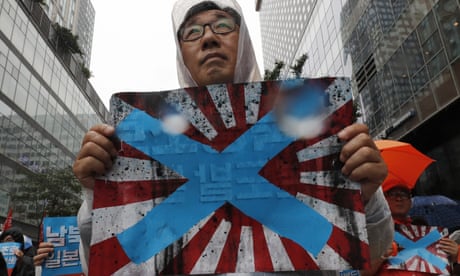Japan’s rising sun flag has a history of horror. It must be banned at the Tokyo Olympics
This article is more than 3 years old
Alexis Dudden
Beloved of the far right, the former imperial standard dishonours the memory of the second world war dead
Sat 2 Nov 2019 02.00 AEDT
235
Imagine if, at the opening ceremony of the 2028 Los Angeles Olympics, the stadium were filled to capacity with fans waving the American Confederate flag. A similarly hurtful scene could become reality at the Tokyo Games next summer, if the Japanese “rising sun” flag is on display.
Japanese athletes and fans regularly sport their national flag – a red ball centred on white. The rising sun symbol is different, however. A red ball with 16 red rays, it is sometimes used by companies in advertisements, yet it is technically a military flag: from 1870 until the end of the second world war, it was imperial Japan’s war flag. Since 1954, a renewed version of the rising sun has been the banner of the Japanese navy, known as the Japan Maritime Self-Defence Force.

South Korea compares Japan's 'rising sun' flag to swastika as Olympic row deepens
Read more
South Korea, which was under Japanese rule from 1910 until 1945, has asked Japan to ban the flag from Olympic stands next year. Tokyo has so far refused, explaining that the flag is “widely used in Japan” and is “not considered a political statement”. But it is not Japan’s national flag, so the International Olympic Committee (IOC) has the authority to exclude it from the Tokyo Games. The leaders of the IOC, together with athletes and their supporters from around the world, should take note of the flag’s history, and how it is, in fact, used to make a particular political statement in Japan today.
For the Japanese right, flying the rising sun flag is part of a collective effort to cleanse the history of imperial Japan’s aggression during the second world war. It appears in the promotional literature and on the websites of groups such as the Zaitokukai, whose members march with signs reading, “Koreans should be massacred!”, and the Nippon Kaigi, which counts the Japanese prime minister, Shinzō Abe, among its members, and has described the second world war in Asia as a “holy war of liberation”.
By embracing the flag, followers signal their belief that the Japanese should take pride in their military history, atrocities included. They are trying to resurrect honour for the country’s failed war effort, much like Americans who cling to Confederate flags. Unlike the Nazi swastika, the rising sun symbol enjoys legal guarantees – under Japan’s freedom of speech laws – yet it causes intentional harm to those who suffered as well as to their descendants.
It is unsurprising that the South Korean government is first to raise objections to the flag, months into a mutually debilitating diplomatic standoff between Tokyo and Seoul. Since July 2019, a spat over trade restrictions and security arrangements has spilled on to the streets in both countries – Japanese beer sales in South Korea are down more than 97% while Korean-themed art exhibits have been cancelled in Japan – prompting many to declare that relations are at their lowest point since Japan’s occupation of Korea ended in 1945. This has been fuelled by polarised perceptions of the history of forced and slave labour during that occupation, when 800,000 Koreans were forcibly mobilised to work in Japan (among other issues, of course). But South Korea is not the only country where the flag causes offence. The IOC should educate itself before concerns and calls to boycott the games spread to China, Singapore, the Philippines or Myanmar, where millions of people suffered similar violence under the rising sun symbol.
Washington must take responsibility for this situation, too. Its perennial insistence that Japan and South Korea “work out among themselves” their wartime histories perpetuates the split by failing to address how the United States put in place many of the post-1945 problems that have affected the region. The standoff has become so bitter that Washington cannot even maintain a security pact arranged between Seoul and Tokyo to share intelligence about North Korean missile launches. Tokyo appears so confident of Washington’s backing that it willfully disregards Allied prisoner of war suffering during the second world war, just as it dismisses the pain endured by the Koreans.
American prisoners of war alone laboured at more than 50 sites in Japan with a death rate of up to 40%, and, although there have been a handful of personal apologies, there have not been reparations for any of those who were enslaved and imprisoned – Koreans, Americans, Chinese, Filipinos, Australians, British soldiers or anyone else. On this point Washington’s evasion stands out: the 1951 Treaty of Peace (the Treaty of San Francisco) and the US-Japan Mutual Security Treaty sacrificed reparations for American security interests – something that troubled other Allies at the time. Throughout, Japanese governments have navigated issues of legal responsibility by sidestepping open discussion of wartime era acts of aggression, including slave labour and even cannibalism.
In the meantime, countless Japanese historians, activists and regular citizens have resisted the efforts of their own government to deny Japanese history, by continuing to dig up bones and government documents, and recording the oral testimonies of those who suffered during Japan’s imperial occupations and wars. Their work gives solid accounting to what happened under the rising sun flag. Too few survivors of Japan’s wartime atrocities remain alive to fill the Olympic stadium and explain the meaning of this symbol. The International Olympic Committee must learn from history instead.
Alexis Dudden is professor of history at the University of Connecticut
No comments:
Post a Comment